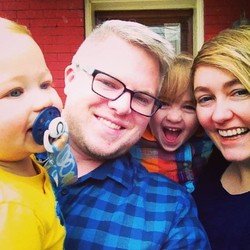Can we do more?
Confronting racism early
By Abby King-Kaiser
I am a campus minister at a predominantly white, Midwestern, Jesuit Catholic university. In the last month we have been rocked by two very public racial incidents that make our black students feel threatened, unsafe, tokenized and ridiculed (their words, from a Black Student Association statement).
One was a social media post—a young white woman in black face, with the caption “who needs white when black lives matter?”—sent around on SnapChat. The other began to circulate on social media after the first began the rounds on Facebook—a picture of a dorm window. Next to a Trump flag, hung a skeleton… in a dashiki.
Social media spread these incidents far beyond those originally involved. And within 72 hours, more than one hundred student leaders staged a silent protest and the school’s Bias Advisory and Response Team held a forum that spilled into 5-6 rooms in the student center when more than nine hundred people showed up. Read some of the local news coverage of all this here.
A colleague from off-campus expressed surprise to me. I cannot say I am surprised, as this is not new behavior—but it is public and identifiable. It cannot be ignored. But it is not new.
Our campus is in a heavily segregated city. We gather students from many different backgrounds and meet them where they are. People of color in our region have long endured overt and underground racism. But, as a city, we value niceness; as a campus, we value service, justice and solidarity, and so I know many (probably white) people feel shocked that something like this could happen at a place like that.
Why am I sharing all of this? Our story is not particularly unique. But, church family, we need your help so that things change before students leave home for college.
Friends, these things do not happen in a vacuum. These are not isolated incidents. They are learned, from culture, from families, from predominantly white institutions like churches.
The forum attracted over 900 students, faculty, staff, and alumni (we are a campus of 4000 undergrads. We literally had people overflowing into five different live stream spaces for conversation). Again and again it was lifted up that this is a symptom of structural and systemic racism and white supremacy. One student called it the disease of ignorance. I want to specifically call it the individual and collective sin of racism.
We come from a confessing church, where we believe that confessing our sins is an important part of reconciling with God and neighbor.
We are a part of a racist culture. Our predominantly white church tradition, often affluent, has included powerful people and communities throughout the history of this country—a history that includes slavery, genocide, segregation, mass incarceration and more.
Church produces and influences culture. Over generations we have produced white supremacist theology and thinking. We have shifted our theology, our particular strand of the Reformed tradition includes confessions that condemn racism and our tradition has long included important black churches, Asian American churches, Latino church, and civil rights leaders of many races. We are not just white, and we have worked towards reconciliation.
But it is not enough, and my friends, I am mostly speaking to my white peers in predominantly white churches here. We have created safe spaces for white supremacist thinking and behavior by ignoring it. We have contributed to a culture where it is OK to communicate something in order to just “piss people off” without regard for that person’s dignity. For this problem to be as pervasive as it is on our college campuses—and it is pervasive even when it is not in the news—we have to have children in our communities who are learning racist thinking and who are learning that it is ok to express in their communities.
Please do something more.
What would it look like if every single predominantly white Presbyterian church in this country addressed racism as a part of Sunday school, as early as kindergarten?
What would it look like if we lifted up the Biblical stories that challenge us to see past social constructs?
What would it look like for our youth groups to talk about race, especially when they are all white, so that ALL of our youth who go to college go equipped to not just avoid bad behavior, but to be allies and advocates on their campuses, shutting down racist behavior, communication, and thinking when they encounter it, especially in all white spaces?
We need to confess our sins of racism and work to be reconciled with God and our neighbor. This is not just a problem where it bubbles up—it is a problem all over this country. If we committed, even as a small churches, to do more, we could have a significant influence on the culture of this country.
This is structural and systemic and we are a part of those systems and structures.
May God forgive us our sins, challenge us to change, transform us into a community that truly and faithfully embodies the beloved community God has envisioned.
LEARN MORE
Discover how the PC(USA) is confronting racism read the Racial Ethnic Torch or visit download Facing Racism, the churchwide anti-racism policy.
Abby King-Kaiser is the assistant director for Ecumenical and Multifaith Ministry at the Dorothy Day Center for Faith and Justice at Xavier University. She returned to her hometown of Cincinnati, Ohio, for this call after a long sojourn in the San Francisco Bay Area. She is a coffee snob, occasional painter, and obsessive, though amateur, Instagrammer (@revabbykk).